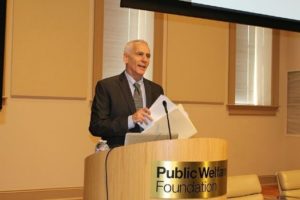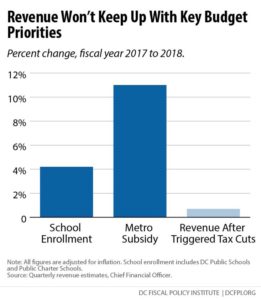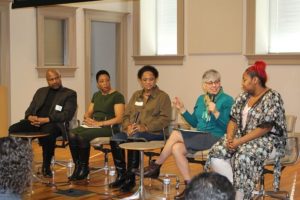The District is thriving financially, with growing revenues and healthy reserves, yet we’ve adopted policies that limit the ability to use these resources to meet our biggest challenges. That is a problem as Mayor Bowser and the Council are getting ready to put together a budget for 2018. A forum yesterday organized by DCFPI and a number of partners talked about how to untie the city’s hands this budget season, so that we can continue to make progress on huge issues like homelessness, Metro and the school achievement gap in the face of federal budget cuts.
 The forum, Progress Amidst Uncertainty, started with economist Jared Bernstein of the Center on Budget and Policy Priorities. He applauded the District as a leader in charting a progressive agenda to address income inequality, including increasing the minimum wage, creating paid family and medical leave, and investing in affordable housing. Bernstein urged the District to continue promoting this agenda, to protect DC residents from threats of federal safety net cuts and to showcase that a different approach to governing is possible.
The forum, Progress Amidst Uncertainty, started with economist Jared Bernstein of the Center on Budget and Policy Priorities. He applauded the District as a leader in charting a progressive agenda to address income inequality, including increasing the minimum wage, creating paid family and medical leave, and investing in affordable housing. Bernstein urged the District to continue promoting this agenda, to protect DC residents from threats of federal safety net cuts and to showcase that a different approach to governing is possible.
 DCFPI’s Ed Lazere focused on how restrictive fiscal policies adopted by DC’s leaders take away the choices that we should have over how to use our growing resources. He highlighted three steps that DCFPI and more than 50 other organizations support to help the District make the most out of the FY 2018 budget.
DCFPI’s Ed Lazere focused on how restrictive fiscal policies adopted by DC’s leaders take away the choices that we should have over how to use our growing resources. He highlighted three steps that DCFPI and more than 50 other organizations support to help the District make the most out of the FY 2018 budget.
- Put automatic tax cuts on hold: A policy established three years ago prioritizes tax cuts as the city’s revenues grow. Yet the automatic “tax-cut triggers” make it hard to address urgent needs, like a growing student population or Metro.
- Use last year’s surplus for important one-time investments: When the city ends the year with a little extra money—a surplus—current rules dictate that the only choice is to put that money in savings. With the District’s fund balance at a record high level, and another large surplus for 2016 (which will be announced very soon), it’s appropriate this year to put some of the it to use to build or preserve affordable housing, provide the start-up costs for the new paid family and medical leave program, or other important things.
- Create a reserve for federal budget cuts: It’s likely that DC will face federal cuts in the coming year, but the full extent is unlikely to be known until well after the DC budget is adopted. The mayor and Council could create a reserve for the coming year to offset these cuts and give time to adjust to the new federal reality.
 The Progress Amidst Uncertainty forum also included a panel discussion led by Children’s Law Center Executive Director Judith Sandalow that included Bread for the City Executive Director George Jones, Academy of Hope Public Charter School CEO Lecester Johnson, and DC residents Angela Hodges and Keyla Ryland. They discussed the urgency of addressing racial inequities and poverty in the District, and the important role that the DC budget can play. Angela Hodges pointed out that without programs like Medicaid, “I wouldn’t be here today.”
The Progress Amidst Uncertainty forum also included a panel discussion led by Children’s Law Center Executive Director Judith Sandalow that included Bread for the City Executive Director George Jones, Academy of Hope Public Charter School CEO Lecester Johnson, and DC residents Angela Hodges and Keyla Ryland. They discussed the urgency of addressing racial inequities and poverty in the District, and the important role that the DC budget can play. Angela Hodges pointed out that without programs like Medicaid, “I wouldn’t be here today.”
If you missed the event, you can watch it below.
